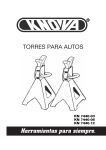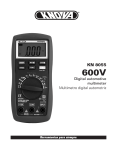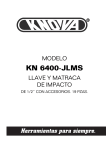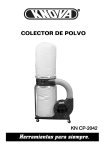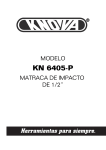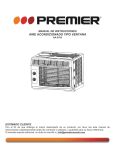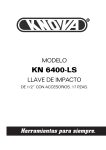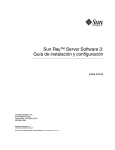Download see manual
Transcript
KN 8052 600V Digital multimeter Multímetro digital KNOVA TABLE OF CONTENTS Safety information 1 Safety symbols 1 Maintenance 1 During use 2 General description Front panel Specifications General Operating instructions 2 3-4 4 4-7 8-10 Battery & fuse replacement 11 Accessories 11 1. SAFETY INFORMATION This multimeter has been designed according to IEC61010-1 concerning electronic measuring instruments with an overvoltage category (CATII) and pollution 2. Follow all safety and operation instructions to ensure that the meter is used safely and is kept in good operating condition. Full compliance with safety standards can be guaranteed only with test leads supplied. If necessary, they must be replaced with the type specified in this manual. SAFETY SYMBOLS Important safety information, refer to the operating manual. Dangerous voltage may be present. Anti-garbage Double insulation (Protection class II). Fuse must be replaced with rating specified in the manual. MAINTENANCE •Before opening the case, always disconnect test leads from all energized circuits. •For continue protection against fire; replace fuse only with the specified voltage and current ratings: 250mA/250V(Quick Acting) 10A/250V(Quick Acting) •Never use the meter unless the back cover is in place and fastened completely. Do not use abrasives or solvents on the meter. To clean It, use a damp cloth and mild detergent only. 1 KNOVA DURING USE • Never exceed the protection limit values indicated in the specifications for each range of measurement. • When the meter is linked to measurement circuit, do not touch the unused terminals. • Never use the meter to measure voltages that might exceed 600V above earth ground in category II installations. • When the value scale to be measured is unknown beforehand, set the range selector at the highest position. • Before rotating the range selector to change functions, disconnect test leads from the circuit under test. • When carrying out measurements on TV or switching power circuits always remember that there may be high amplitude voltages pulses at test points, which can damage the meter. • Always be careful when working with voltages above 60Vdc or 30V ac rms. Keep fingers behind the probe barriers when making voltage measurements with test leads. • Never perform resistance measurements on live circuits. GENERAL DESCRIPTION The meter is a handheld 31/2 digital multimeter for measuring DC and AC voltage, DC current, Resistance, Diode, and Continuity Test, battery operated. The meter has a back light function to be used in a dark environment. 2 FRONT PANEL 1 2 3 4 5 6 7 8 3 KNOVA FRONT PANEL DESCRIPTION 1- Non-contact voltage detection indicator (red LED) 2- Display: 3 1/2 digit,(2000 count) LCD. 3- Back light: When this button is pushed, the Back light of display is turned on. After about 10 seconds, the Back light will be turned off automatically. In order to turn on the Back light again, just push this button once. 4- Hold button: When this button is pushed, the display will keep the last reading and an “ H ” symbol will appear on the LCD until you push it again. 5- Rotary switch: This switch is used to select functions and desired ranges as well as to turn on/off the meter. 6- “COM” jack : Plug in connector for black (negative) test lead. 7- “10A” jack: Plug in connector for red test lead for10A measurement. 8- “VΩmA” jack: Plug in connector for red (positive) test lead for voltage, resistance and current (except 10A) measurements. SPECIFICATIONS Accuracy is specified for a period of one year after calibration and at 18 to 28℃ (64°F to 82°F) with relative humidity to 80%. GENERAL Maximum voltage between terminals and earth ground: CATII 600V Fuse protection: F 250mA/250V 10A/250V Power: 9V battery, NEDA 1604 or 6F22 Display: LCD 2000 counts, updates 2-3/ sec. Measuring method: Dual-slope integration A/D converter Over range Indication: Only figure “1” on the display Polarity indication: “-”displayed for negative polarity Operating Environment: 0 to 40℃ Storage temperature: -10℃ to 50℃. Low battery indication: “ + - ”appears on the display Size: 140mm×67mm×30mm Weight: Approx.112g. 4 DC VOLTAGE Range Resolution Accuracy 200mV 100μV ±0.5% of rdg ± 2 digits 2V 1mV ±0.5% of rdg ± 2 digits 20V 10mV ±0.5% of rdg ± 2 digits 200V 100mV ±0.5% of rdg ± 2 digits 600V 1V ±0.8% of rdg ± 2 digits Overload Protection: 250V rms. For 200mV range and 600V dc or rms. ac for other ranges. DC CURRENT Range Resolution Accuracy 200μA 0.1μA ±1% of rdg ± 2 digits 2mA 1μA ±1% of rdg ± 2 digits 20mA 10μA ±1% of rdg ± 2 digits 200mA 100μA ±1.5% of rdg ± 2 digits 10A 10mA ±3% of rdg ± 2 digits Overload Protection: F 250mA/250V fuse. F 10A/250V fuse 5 KNOVA AC VOLTAGE Range Resolution Accuracy 200V 100mV ±1.2% of rdg ± 10 digits 600V 1V ±1.2% of rdg ± 10 digits Overload Protection: 600V dc or rms. ac for all ranges. Frequency range: 40Hz to 400Hz Response: Average responding, calibrated in rms. of a sine wave. DIODE & CONTINUITY Range Accuracy If continuity exists (about less than 100Ω), built-in buzzer will sound. Show the approx. forward voltage drop of the diode. Overload Protection: 250V dc or rms. ac. 6 RESISTANCE Range Resolution Accuracy 200Ω 0.1Ω ±0.8% of rdg ± 3 digits 2kΩ 1Ω ±0.8% of rdg ± 2 digits 20kΩ 10Ω ±0.8% of rdg ± 2 digits 200kΩ 100Ω ±0.8% of rdg ± 2 digits 2MΩ 1kΩ ±1.0% of rdg ± 2 digits Maximum Open Circuit Voltage: 3.2 V Overload Protection: 250V dc or rms. ac for all ranges. Non-contact voltage detection Resolution Alerts >AC90V Red LED lit 7 KNOVA OPERATING INSTRUCTIONS DC VOLTAGE MEASUREMENT 1. Connect the red test lead to the “V.Ω.mA” jack and the black lead to the “COM” jack. 2. Set rotary switch at desired DCV position. If the voltage to be measured is not known beforehand, set range switch at the highest range position and then reduce it until satisfactory resolution is obtained. 3. Connect test leads across the source or load being measured. 4. Read voltage value on the LCD display along with the polarity of the red lead connection. DC CURRENT MEASUREMENT 1. Connect the red test lead to the “V.Ω.mA” jack and the black test lead to “COM” jack. (For measurements between 250mA and 10A, remove red lead to“10A”jack.) 2. Set the rotary switch at desired DCA position. 3. Open the circuit in w hich the current is to be measured, and connect test leads in series with the circuit. 4. Read current value on LCD display along with the polarity of red lead connection. AC VOLTAGE MEASUREMENT 1. Connect the red test lead to “V.Ω. mA” jack and the black test lead to the “COM” jack. 2. Set the rotary switch at desired ACV position. 3. Connect test leads across the source or load being measured. 4. Read voltage value on the LCD display. 8 RESISTANCE MEASUREMENT 1. Connect the red test lead to “V. Ω. mA” jack and black test lead to the “COM” jack. (The polarity of red lead is positive “+”.) 2. Set the rotary switch at desired ”Ω” range position. 3. Connect test leads across the resistor to be measured and read LCD display. 4. If the resistance being measured is connected to a circuit, turn off power and discharge all capacitors before applying test probes. DIODE TEST 1. Connect the red test lead to “V.Ω.mA” jack and the black test lead to the “COM” jack (The polarity of red lead is positive “+”.). 2. Set the rotary switch at “ ” position. 3. Connect the red test lead to the anode of the diode to be tested and the black test lead to the cathode of the diode. The approx. forward voltage drop of the diode will be displayed. If the connection is reversed, only figure “1” will be shown. AUDIBLE CONTINUITY TEST 1. Connect red test lead to “V.Ω.mA”, black test lead to “COM”. 2. Set range switch to “ ” position. 3. Connect test leads to two points of circuit to be tested. If continuity exists, built-in buzzer will sound. 9 KNOVA Non-contact voltage detection 1. When the meter head is close to the AC voltage field, the LED light the close distance is about 30mm from the AC voltage field. ! WARNING Even without LED indication, the voltage may still exist. Do not rely on non-contact voltage detector to determine the presence of voltage wire, Detection operation may be subject to socket design, insulation thickness and different type and other factors 10 BATTERY & FUSE REPLACEMENT If “ + - ”appears on display, it indicates that the battery should be replaced. The fuse rarely needs replacement and blows almost always as a result of operator’s error. To replace the battery and the fuse (250mA/250V and 10A/250V) remove the 2 screws in the bottom of the case. Simply remove the old one, and replace with a new one. Be careful to observe battery polarity. ! WARNING Before attempting to open the case, always be sure that test leads have been disconnected from measurement circuits. Close case and tighten screws completely before using the meter to avoid electrical shock hazards. ACCESSORIES • Operator’s instruction manual • Set of test leads • Gift box • 9 volt battery. NEDA 1604 6F22 006P type (optional) 11 KNOVA TABLA DE CONTENIDOS Información de seguridad 13 Símbolos de seguridad 13 Mantenimiento 13 Durante el uso 14 Descripción general Panel frontal Especificaciones 14 15-16 16 General 16-19 Instrucciones de operación 20-22 Cambio de bateria y fusibles 23 Accesorios 23 INFORMACIÓN DE SEGURIDAD Este multímetro ha sido diseñado de acuerdo a la IEC61010-1 concerniente a los instrumentos electrónicos de medición con una categoría de sobretensión (CATII) y contaminación de grado 2. Siga todas las instrucciones de operación y seguridad para garantizar el uso seguro del multímetro y su mantenimiento en buenas condiciones operativas. El cumplimiento total de los estándares de seguridad sólo puede garantizarse si se utilizan los cables de prueba provistos. De ser necesario, deben reemplazarse por unos del mismo tipo, especificado en este manual. SÍMBOLOS DE SEGURIDAD Información de seguridad importante, remítase al manual de operación. Posible presencia de voltaje peligroso. Anti-basura Doble aislamiento (Protección de clase II). El fusible debe ser cambiado por uno de la categoría especificada en el manual. MANTENIMIENTO •Antes de abrir la carcasa, desconecte siempre los cables de prueba de todos los circuitos con electricidad. •Para una protección contra el fuego asegurada, reemplace el fusible únicamente por uno con el voltaje y las categorías de corriente especificados; 250mA/250V (Acción Rápida)10A/250V(Acción Rápida) •Nunca utilice el multímetro a menos que la cubiertatrasera esté ubicada y ajustada completamente. •No utilice abrasivos ni solventes sobre el multímetro. Para limpiarlo, utilice un paño húmedo y detergente suave únicamente. 13 KNOVA DURANTE EL USO •Nunca sobrepase los valores del límite de protección indicados en las especificaciones para cada escala de medición. •Cuando el multímetro esté conectado a un circuito de medición, no toque las terminales que no están en uso. •Nunca utilice el multímetro para medir voltajes que puedan exceder los 600V sobre el nivel del suelo en instalaciones de categoría II •Cuando la escala de valores a medir no se conoce de antemano, sitúe el selector de escalas en la posición más alta. •Antes de girar el selector de escalas para cambiar de función, desco necte los cables de prueba del circuito a prueba. •Al realizar mediciones de televisores o al cambiar los circuitos eléc tricos, siempre recuerde que puede haber pulsos de voltajes de gran amplitud en los puntos de prueba, que pueden dañar al multímetro. •Siempre sea cuidadoso al trabajar con voltajes superiores a los 60V cd ó 30V ac rms. Mantenga sus dedos detrás de las barreras de detección cuando realice mediciones de voltaje con cables de prueba. •Nunca realice mediciones de resistencia sobre circuitos vivos. DESCRIPCIÓN GENERAL El medidor es un multímetro digital portátil 31/2 para realizar mediciones de voltaje CD y CA, Corriente CD, Resistencia, Diodo y Prueba de Continuidad, con funcionamiento a batería. El multímetro cuenta con la función de luz de fondo, que se utiliza en ambientes oscuros. 14 PANEL FRONTAL 1 2 3 4 5 6 7 8 15 KNOVA DESCRIPCIÓN DEL PANEL FRONTAL 1- Indicador de detección de voltaje sin contacto (LED rojo) 2- Pantalla de 3 1/2 dígitos, (cuenta hasta 2000) LCD. 3- Luz de fondo: Cuando se pulsa este botón, se enciende la Luz de fondo de la pantalla. Luego de aproximadamente 10 segundos, la Luz de fondo se apaga automáticamente. 4- Botón “Retener”: Cuando se pulsa este botón, la pantalla retendrá la última lectura y se visualizará el símbolo “ H “en el LCD hasta que el mismo se vuelva a pulsar. 5- Interruptor rotativo: Este interruptor se utiliza para seleccionar las funciones y escalas deseadas así como para encender/apagar el multímetro. 6- Conector “COM”: Conector de entrada para el cable de prueba negro (negativo). 7- Conector de “10A”: Conector de entrada para el cable de prueba rojo para mediciones de 10A. 8- Conector “VΩmA”: Conector de entrada para el cable de prueba rojo (positivo) para mediciones de voltaje, resistencia y corriente (exceptuando 10A). ESPECIFICACIONES La precisión se especifica por el período de un año luego de la calibración y a una temperatura de 18°C a 28°C (64°F a 82°F) con una humedad relativa de hasta el 80%. GENERAL Máximo voltaje entre terminales y tierra: CATII 600V Protección con Fusible: F 250mA/250V 10A/250V Energía: 9V battery, NEDA 1604 or 6F22 Pantalla: LCD 2000 counts, updates 2-3/ sec. Método de Medición: Dual-slope integration A/D converter Indicación de Sobrepaso de escala: Only figure “1” on the display Indicación de polaridad: “-”displayed for negative polarity Temperatura Ambiente de Operación: 0 to 40℃ Temperatura de almacenamiento: -10℃ to 50℃. Aviso de batería baja: “ + - ”appears on the display Tamaño: 140mm×67mm×30mm Peso: Approx.112g. 16 VOLTAJE CD Escala Resolución Precisión 200mV 100μV ±0.5% de lectura ± 2 digitos 2V 1mV ±0.5% de lectura ± 2 digitos 20V 10mV ±0.5% de lectura ± 2 digitos 200V 100mV ±0.5% de lectura ± 2 digitos 600V 1V ±0.8% de lectura ± 2 digitos Protección de Sobrecarga: 250V rms. Para una escala de 200mV y 600V cd ó ca rms para otras escalas. CORRIENTE CD Escala Resolución Precisión 200μA 0.1μA ±1% de lectura ± 2 digitos 2mA 1μA ±1% de lectura ± 2 digitos 20mA 10μA ±1% de lectura ± 2 digitos 200mA 100μA ±1.5% de lectura ± 2 digitos 10A 10mA ±3% de lectura ± 2 digitos Protección de Sobrecarga: Fusible F 250mA/250V. Fusible F 10A/250V 17 KNOVA VOLTAJE CA Escala Resolución Precisión 200V 100mV ±1.2% de lectura ± 10 digitos 600V 1V ±1.2% de lectura ± 10 digitos Protección de Sobrecarga: 600V cd ó ac rms para todas las escalas. Escala de frecuencia: 40Hz a 400Hz. Respuesta: Respuesta promedio, calibrada en rms de onda sinusoidal. DIODOS & CONTINUIDAD Escala Descripción Si hay continuidad (por ejemplo, una resistencia menor a 100Ω), sonará la alarma incorporada. Muestra la caída del voltaje directo aproximado del diodo. Protección de Sobrecarga: 250V cd ó rms ac. 18 RESISTENCIA Escala Resolución Precisión 200Ω 0.1Ω ±0.8% de lectura ± 3 digitos 2kΩ 1Ω ±0.8% de lectura ± 2 digitos 20kΩ 10Ω ±0.8% de lectura ± 2 digitos 200kΩ 100Ω ±0.8% de lectura ± 2 digitos 2MΩ 1kΩ ±1.0% de lectura ± 2 digitos Máximo Voltaje de Circuito Abierto: 3,2V Protección de Sobrecarga: 250V cd ó ca rms para todas las escalas. Detección de voltaje sin contacto Resolución Alertas >AC90V Se enciende el LED rojo 19 KNOVA INSTRUCCIONES DE OPERACIÓN MEDICIÓN DE VOLTAJE CD 1. Conecte el cable de prueba rojo al conector “VΩ.mA” y el cable de prueba negro al conector “COM”. 2. Sitúe el interruptor rotativo en la posición DCV deseada. Si el voltaje a medir no se conoce de antemano, sitúe el selector de escalas en la posición de escala más alta y luego redúzcala hasta alcanzar una resolución satisfactoria. 3. Conecte los cables de prueba a la fuente o carga a medir. 4. Lea el valor del voltaje que se visualiza en la pantalla LCD junto con la polaridad de la conexión del cable rojo. MEDICIÓN DE CORRIENTE CD 1. Conecte el cable de prueba rojo al conector “VΩ.mA” y el cable de prueba negro al conector “COM”. (Para mediciones de entre 250mA y 10A, retire el cable rojo del conector “10A”). 2. Sitúe el interruptor rotativo en la posición DCA deseada. 3. Abra el circuito en el que se encuentra la corriente a medir y conecte los cables de prueba en serie al circuito. 4. Lea el valor de la corriente que se visualiza en la pantalla LCD junto con la polaridad de la conexión del cable rojo. MEDICIÓN DE VOLTAJE CA 1. Conecte el cable de prueba rojo al conector “V.Ω.mA” y el cable de prueba negro al conector “COM”. 2. Sitúe el interruptor rotativo en la posición ACV deseada. 3. Conecte los cables de prueba a la fuente o carga a medir. 4. Lea el valor del voltaje que se visualiza en la pantalla LCD. 20 MEDICIÓN DE RESISTENCIA 1. Conecte el cable de prueba rojo al conector “V.Ω.mA” y el cable de prueba negro al conector “COM”. (La polaridad del cable rojo es positiva “+”.) 2. Sitúe el interruptor rotativo en la posición de escala “Ω”. 3. Conecte los cables de prueba al reactor a medir y lea la pantalla LCD. 4. Si la resistencia medida se conecta a un circuito, apague la corriente y descargue todos los condensadores antes de aplicar los sensores de prueba. PRUEBA DE DIODOS 1. Conecte el cable de prueba rojo al conector “V.Ω.mA” y el cable de prueba negro al conector “COM” (La polaridad del cable de prueba rojo es positiva “+”). 2. Sitúe el interruptor rotativo en la posición de escala “ “. 3. Conecte el cable de prueba rojo al ánodo del diodo a medir y el cable de prueba negro al cátodo del diodo. Se visualizará la caída aproximada del voltaje directo del diodo. Si la conexión está invertida, únicamente se mostrará la figura “1”. PRUEBA DE CONTINUIDAD AUDIBLE 1. Conecte el cable de prueba rojo al conector “V.Ω.mA” y el cable de prueba negro al conector “COM”. 2. Sitúe el interruptor de escalas en la posición “ “. 3. Conecte los cables de prueba a dos puntos del circuito a probar. Si hay continuidad, sonará la alarma incorporada. 21 KNOVA Detección de voltaje sin contacto 1. Cuando el multímetro se acerca al campo de voltaje CA, el LED indicará que la distancia más cercana es de aproximadamente 30mm del campo de voltaje CA. ! ADVERTENCIA Incluso sin la indicación del LED, es posible que haya voltaje. No confíe en el detector de voltaje sin contacto para determinar la presencia de un cable de voltaje, ya que la operación de detección caría de acuerdo al diseño del enchufe, espesor y tipo del aislamiento, entre otros factores. 22 CAMBIO DE BATERÍA & FUSIBLES Si se visualiza el símbolo “ + - ” en la pantalla, estará indicando que la batería debe ser reemplazada. Los fusibles rara vez necesitan ser reemplazados, y casi siempre se queman como consecuencia de un error del operador. Para reemplazar la batería y el fusible (250mA/250V and 10A/250V), retire los dos tornillos de la parte inferior de la carcasa. Simplemente retire el elemento viejo y reemplácelo por uno nuevo. Asegúrese de contemplar la polaridad de la batería. ! ADVERTENCIA Antes de intentar abrir la carcasa, asegúrese de que los cables de prueba estén desconectados de los circuitos de medición. Cierre la carcasa y ajuste los tornillos completamente antes utilizar el multímetro, a fin de evitar riesgos de descarga eléctrica. ACCESORIOS • Manual del operador • Juego de cables de prueba • Caja de regalo • Batería de 9 voltios tipo NEDA 1604 6F22 006P (opcional) 23 KNOVA www.knova.com.mx



























